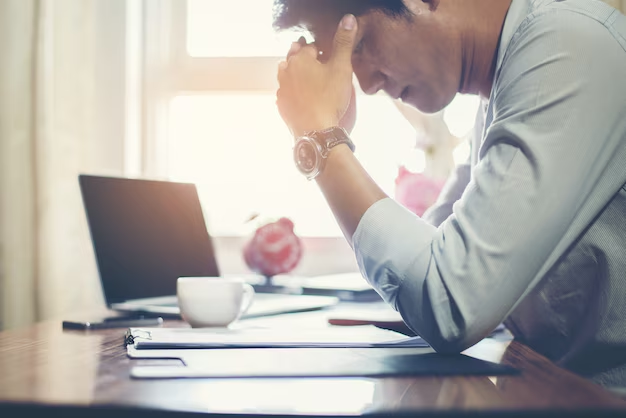Can Anxiety Affect Your Blood Pressure? Understanding the Link
In today’s fast-paced world, anxiety has become an almost ubiquitous companion. Whether it's your job, financial concerns, or personal relationships, anxiety seems to be just a heartbeat away. But speaking of heartbeats, have you ever wondered if there's a direct connection between your anxiety levels and your blood pressure? Let's delve into the fascinating interplay between these two and explore the implications this has on your overall health.
What is Anxiety?
Before we discuss how anxiety might affect blood pressure, it’s essential to understand what anxiety truly is. Anxiety is a natural response your body has to stress. It's a feeling of fear or apprehension about what’s to come. Occasional anxiety is normal and can be a healthy reaction to stressful situations. However, when anxiety becomes chronic, it could lead to a range of psychological and physical issues.
Symptoms of Anxiety
- Nervousness or restlessness
- Rapid heart rate
- Sweating
- Trembling
- Feeling weak or tired
- Difficulty concentrating
Understanding these symptoms can help identify situations where anxiety might be affecting your health more directly than you know.
How Blood Pressure Works
Blood pressure measures the force your blood exerts on the walls of your arteries. A blood pressure reading consists of two numbers measured in millimeters of mercury (mmHg):
- Systolic pressure: The first number, indicating the pressure in your arteries when your heart beats.
- Diastolic pressure: The second number, measuring the pressure in your arteries when your heart rests between beats.
Normal Blood Pressure Levels
- Normal: Less than 120/80 mmHg
- Elevated: 120-129/80 mmHg
- Stage 1 Hypertension: 130-139/80-89 mmHg
- Stage 2 Hypertension: 140/90 mmHg or higher
Keeping these numbers in check is crucial for sustaining good cardiac health.
Can Anxiety Raise Blood Pressure?
Anxiety can indeed cause a temporary spike in blood pressure. When you feel anxiety, your body enters a “fight-or-flight” response. During this response, stress hormones such as adrenaline pump through your body, increasing your heart rate and blood pressure.
Why Anxiety Causes a Blood Pressure Spike
- Adrenaline Surge: This hormone makes your heart beat faster, sending more blood to your muscles and other essential areas.
- Vasoconstriction: Your blood vessels constrict, increasing the pressure needed to push blood through.
- Increased Heart Rate: More blood is pumped per minute, raising systolic pressure.
It's important to note that while anxiety can cause temporary blood pressure increases, it doesn’t cause long-lasting high blood pressure (hypertension). However, chronic anxiety might contribute to unhealthy lifestyle practices that could result in long-term hypertension.
Long-term Effects: Anxiety-Induced Hypertension?
While temporary blood pressure spikes due to anxiety are usually harmless, consistent anxiety can have long-term implications. Over time, lifestyle changes driven by anxiety—such as poor diet, lack of exercise, and substance misuse—can contribute significantly to sustained high blood pressure.
Potential Causes of Long-term Hypertension from Anxiety
- Poor Diet Choices: Anxiety can lead to stress eating, often involving high salt or sugary foods, which can elevate blood pressure.
- Lack of Exercise: Anxiety might sap your energy levels or make you feel demotivated, leading to a sedentary lifestyle.
- Substance Use: Some may turn to alcohol or tobacco to cope with anxiety, driving blood pressure levels higher.
- Sleep Issues: Anxiety-induced insomnia can lead to increased blood pressure over time.
Managing Anxiety to Control Blood Pressure
Effective management of anxiety is key to preventing its negative effects on blood pressure and overall health. Here are several strategies:
Psychological Strategies
- Cognitive Behavioral Therapy (CBT): This can help you understand and change thought patterns that drive anxiety.
- Mindfulness and Relaxation Techniques: Practices such as meditation, yoga, and deep breathing can be incredibly beneficial.
Lifestyle Modifications
- Regular Exercise: Physical activity helps regulate both anxiety and blood pressure by boosting serotonin and endorphin levels.
- Balanced Diet: Consuming a diet rich in fruits, vegetables, and lean proteins can maintain a healthy blood pressure.
- Limit Caffeine and Alcohol: These can exacerbate anxiety and prompt temporary blood pressure increases.
Social and Emotional Support
- Support Groups: Sharing feelings in a supportive environment can reduce anxiety.
- Open Communication: Talking about your concerns with friends, family, or professionals can alleviate anxiety.
When to Seek Help
While occasional anxiety is normal, if you find your anxiety interfering significantly with daily life or if it seems to be affecting your physical health, such as your blood pressure, it might be time to consult a healthcare professional.
Signs You May Need Professional Help
- Anxiety that doesn't go away or worsens over time
- Difficulty achieving daily tasks due to anxiety
- Persistent high blood pressure despite lifestyle changes
Healthcare providers can work with you to develop a treatment strategy that's tailored to your needs.
Final Thoughts
Recognizing the connection between anxiety and blood pressure is the first step toward taking control of your health. While anxiety can cause temporary blood pressure increases, it's not a direct cause of chronic hypertension. However, long-term anxiety can lead to lifestyle choices that might elevate blood pressure over time. By implementing stress-reducing techniques and making healthier lifestyle choices, you can navigate this complex interaction more effectively.
Key Takeaways
- 🩺 Anxiety may cause temporary increases in blood pressure through a "fight-or-flight" response.
- 💡 Chronic anxiety can influence lifestyle choices that contribute to sustained hypertension.
- 🏃♂️ Regular exercise and a balanced diet are effective ways to manage anxiety and blood pressure.
- 🧘♀️ Mindfulness practices and social support can help mitigate anxiety levels.
- 🔍 Consult a healthcare professional if anxiety and blood pressure issues persist.
Understanding how anxiety affects your body, particularly your blood pressure, empowers you to take proactive steps toward a healthier, more balanced life.

